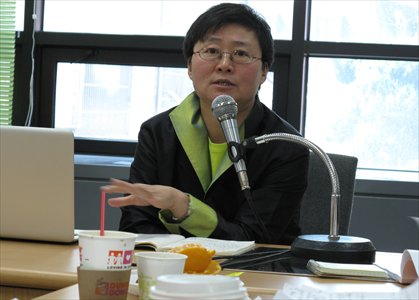HOME >> METRO BEIJING
Pink crusader
By Zhang Yiqian Source:Global Times Published: 2013-7-28 18:28:01

He Xiaopei turned her back on a lucrative career to advocate sexual minority rights. Photo: Courtesy of He Xiaopei
He Xiaopei clearly remembers the first time she met an HIV carrier.It was 2003 and He was finishing her PhD on cultural studies with a dissertation about people living with AIDS in China.
"It was difficult. I spent three fruitless months looking for people willing to speak. Not many people would talk about their situation back then, and there weren't as many studies on such minority groups," she said.
Eventually, He found a man whose daughter had contracted HIV from a botched blood transfusion; he was suing the hospital and was eager to talk about the case.
He, who in 2007 co-founded the Pink Space Sexuality Research Center, provides a story-telling platform for minority groups, especially women and children.
The center is dedicated to giving a voice to the sexually oppressed, particularly women living with HIV/AIDS, sex workers, transgenders, women married to gay men, lesbians, bisexuals and women with disabilities.
Leaving Zhongnanhai
He worked for the State Council for 14 years, serving part of this time in the office in charge of reforming the Medicare system.
Back then she didn't have any idea about gender studies, let alone sex studies. When people asked her what she felt about gender roles, she replied: "It's equally good, whether you have a girl or a boy," reciting a government slogan aiming to prevent the abortion of female fetuses.
In 1995, He went to a UN women's rights conference that proved to be an eye-opening experience.
Many topics were discussed during the conference, such as the sexual rights of women.
He decided to further her study in this field. In 1999, she applied for a master's program in the UK on gender and development studies, although it was a decision that caused friction with her family.
"My parents said, 'Why are you doing this? You have such a good job working at [the State Council headquarters] Zhongnanhai,'" He recalled.
But He felt it was time to live for herself by pursuing a goal close to her heart. "I worked for 14 years for the government. Enough was enough," she said.
After completing her master's degree, she did another one on sexual dissidents and cultural change, then pursued her PhD.
Telling their stories
When she came back to China in 2007, He started Pink Space with a couple of friends. She was inspired to give sexual minorities a voice.
"Many people were being discriminated against. Homosexuals were at least organized with [advocacy] groups, but others were not," she said.
While conducting research for her dissertation, He learned more about the discrimination such minorities faced. Sex workers were more marginalized than homosexuals yet lacked any support networks, He found.
"Health officials thought [sexual minorities] shouldn't have the right to have sex," He said. "I even heard how a woman married to a gay man was barred from sharing her story at a conference."
The most simple and effective way to combat discrimination is to circulate such stories in society and hope for better understanding and tolerance, He decided.
Her center became the first in Beijing to listen to and share stories of women married to gay men in 2009. Since then, the center's voice and those of its members has grown stronger and forced even policymakers to listen.
The center initially held meetings for such minority groups, but He soon felt it was more important to broaden the audience by experimenting with film and photography.
In 2012, the center shot a documentary titled The Lucky One about a woman, Zhang Xi, who has AIDS and is dying from late-stage hepatoma.
He met Zhang in 2008 at a Pink Space meeting and she seemed eager to speak, so He gave her a digital recorder and camera and asked her to keep an audio diary. He also visited Zhang daily. Together, they recorded the last days of her life.
Speaking out
Even though the film received widespread acclaim and might be screened at next month's Beijing Independent Film Festival in Songzhuang, He said there are still many challenges in her line of work.
"Independent films in China are never played publicly," she said, hinting at the festival's history of being shut down by authorities. "It's not difficult to make such films, but you have to find a chance to show them to society."
He has instead turned to online forums, Weibo and video-sharing websites to promote her film. Despite the sensitive nature of its topic, He has found it difficult to win over the public's interest.
"If you look at Weibo, fresh information can disappear within five minutes," He said.
She has also discovered speaking out against the norm to be difficult. Currently, He is working on a film that explores sham marriages between female and male homosexuals. She has interviewed four couples preparing for marriage to keep up appearances and appease their family and society.
"Many people come to me and ask how I can support such a thing," she said, explaining couples often don't have a choice. "What are they going to do otherwise?"
It's always better to show people stories because it gives them a visual understanding, He insists, pointing out that media coverage of the HIV epidemic in the early 1980s was universally grim. It wasn't until individual stories of HIV carriers emerged that society began to view them as normal people, He said.
"Sharing the stories of sexual minorities is an empowering way to help them," He said. "When you find that you are not alone, that there's a group of people just like you, it gives you the confidence to be yourself."
Posted in: Metro Beijing